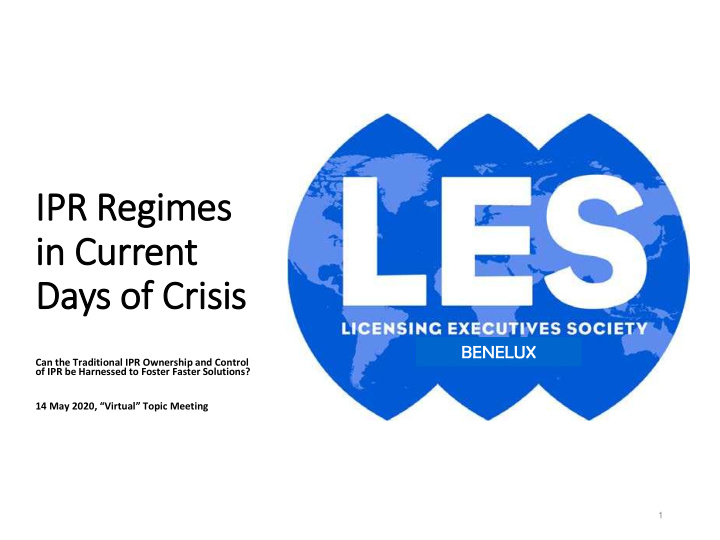



IPR R Regi gimes s in C n Current Days o s of Crisi sis BENELUX Can the Traditional IPR Ownership and Control of IPR be Harnessed to Foster Faster Solutions? 14 May 2020, “Virtual” Topic Meeting 1
Agenda • Welcoming note by Dr Achim Krebs, President LES Benelux, Partner at HGF • Brief presentation and interview with Christophe Verbruggen, Director - Legal Affairs R&D EMEA at Janssen Pharmaceuticals (J&J), followed by a Q&A session • Round table discussion with participants on subjects of particular interest for the next session of our new online topic event format. 2
IPR R Regi egimes i in n Cur urren ent Da Days of C Crisis is • Covid-19 presents an unprecedented crisis for mankind – and this usually leads to step changes in technology developments. • We are seeing many initiatives forming, involving private companies and many public institutions across the globe, making every effort to find a (preventive) treatment. • How can these rights be harnessed by private individuals and companies to develop and supply essential new technologies? • Do we have the legal mechanisms that facilitate quantitatively and qualitatively sufficient, and financially acceptable, exploitation of IP rights? • How to handle the global tsunami of compulsory licensing developments spreading around the globe? • Are national IP Rights in the way of a borderless cooperation? 3
Do Do we need e need to cha hange our ur pr pract ctice ce? • Does “Socially responsible licensing” form a suitable alternative? • Public and private sector organisations alike are rapidly signing up to the recently launched “Covid Pledge”, initiative driven by faculty members and researchers across the globe. • “Preset menu“ for royalty fee licence conditions for the use if IPR is relevant or required in the battle to fight Covid-19 as a pandemic. • Unprecedented co-operations between competitors – but how about competition laws? • Increasing numbers of governments and public authorities have issued different iterations of “march-in rights” or “compulsory licensing rights”*: • Prevent IPR owner from exercising full control over commercial use of IP Rights, giving direct access, or even sublicence rights. • Called for in emergency situations, to manage short-term health care, infrastructure and other services critical to disaster recovery. • Balanced impact on Investment and willingness to carry the risks involved? * See for instance: https://www.wipo.int/edocs/mdocs/scp/en/scp_30/scp_30_3-main1.pdf 4
Roundtable Discussion A few possible subjects for our next topic sessions • The advent of compulsory licensing • When, where and how is a crisis a “Force Majeure”? • Milestones missed in agreed developments due to public restrictions – an “act of god”? • Bankruptcy and licence position • Use of Data • E-signatures/validity of documents and electronic signatures in general 5
LES Virtual Discussion Forum
Licences on I nvestm ents The Quid Pro Quo? • Licences /Ownership Transfers versus • Own Investment of the collaborating parties • Funding origin of a 1:1 Company/Academic Project : • Fully funded by Company • Partially funded by Company / Partially by Academic Centre • Partially funded by Company / By an external grantor (charity, fund, government, seed funding, venture capital) (e.g. PPP, IMI) • Fully funded by an external grantor (e.g. H2020) • The more a party invests from its own, the more rights it may expect… - 7 -
Access Rights Conditions ( potential term s) Access rights granted by a On Background On Results beneficiary to another: Beneficiaries for completion of Royalty-free Royalty-free the action: Usually Royalty-free Beneficiaries and affiliates for Usually (depends usually on Research Use: Fair & Reasonable result cat. or field) Third Parties for Research Use Appropriate (tbn) Appropriate (tbn) after the action: conditions conditions Other Beneficiaries, affiliates or To be negotiated later, To be negotiated later, Third Parties for Direct may be refused may be refused Exploitation: - 8 -
Typcial Modalities • Pre-agreed • Requested/Granted Upon signature of the agreement • Difference of “Treatment” versus a “Research Tool” • If extra costs, defined • Collaborating partner should not be in a disadvantaged position versus a third party • Pre-agreed licences even more so the case in public health threat projects, to avoid loss of negotiation time and ensure further use • Less of issue as the fact most data and results will be published, so will be available freely - 9 -
- 10 -
Access & Affordability ( exam ple) • Publication of Research in open access journals (no cost for accession research results) • Access to Research Data (data are available/fast) • Access to Terminated assets (anti-shelving) • Availability & Affordability in L-LMIC of identified treatment • Use of unique regulatory pathways • Can never be obliged to make available at a loss - 11 -
Public Health Threat Projects • Speed is essence…. • How • Experienced Teams (all disciplines) • Dedication (freeing up time of staff from other projects) • Use of templates • Use of historical solutions to legal & IP problems, licensing solutions • Clear roles on who drives what • Direct lines of feedback to government, grant agencies and higher management • Entity must be prepared to work outside of regular “policies” • Example: we don’t do electronic signature because our org does not allow it. - 12 -
x Thank You / Q&A - 13 -
Recommend
More recommend